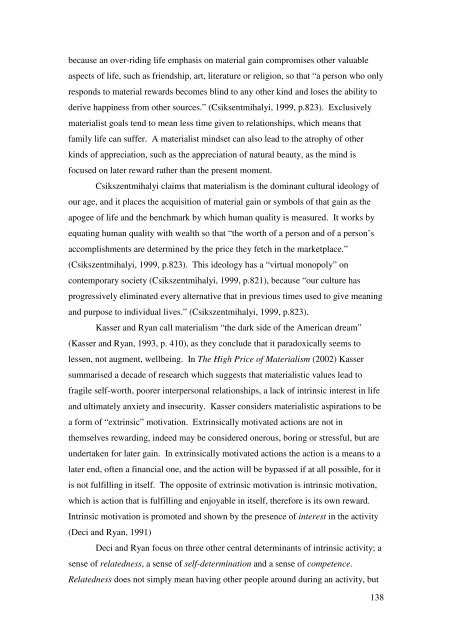DEVELOPMENTAL CRISIS IN EARLY ADULTHOOD: A ...
DEVELOPMENTAL CRISIS IN EARLY ADULTHOOD: A ...
DEVELOPMENTAL CRISIS IN EARLY ADULTHOOD: A ...
You also want an ePaper? Increase the reach of your titles
YUMPU automatically turns print PDFs into web optimized ePapers that Google loves.
ecause an over-riding life emphasis on material gain compromises other valuable<br />
aspects of life, such as friendship, art, literature or religion, so that “a person who only<br />
responds to material rewards becomes blind to any other kind and loses the ability to<br />
derive happiness from other sources.” (Csiksentmihalyi, 1999, p.823). Exclusively<br />
materialist goals tend to mean less time given to relationships, which means that<br />
family life can suffer. A materialist mindset can also lead to the atrophy of other<br />
kinds of appreciation, such as the appreciation of natural beauty, as the mind is<br />
focused on later reward rather than the present moment.<br />
Csikszentmihalyi claims that materialism is the dominant cultural ideology of<br />
our age, and it places the acquisition of material gain or symbols of that gain as the<br />
apogee of life and the benchmark by which human quality is measured. It works by<br />
equating human quality with wealth so that “the worth of a person and of a person’s<br />
accomplishments are determined by the price they fetch in the marketplace.”<br />
(Csikszentmihalyi, 1999, p.823). This ideology has a “virtual monopoly” on<br />
contemporary society (Csikszentmihalyi, 1999, p.821), because “our culture has<br />
progressively eliminated every alternative that in previous times used to give meaning<br />
and purpose to individual lives.” (Csikszentmihalyi, 1999, p.823).<br />
Kasser and Ryan call materialism “the dark side of the American dream”<br />
(Kasser and Ryan, 1993, p. 410), as they conclude that it paradoxically seems to<br />
lessen, not augment, wellbeing. In The High Price of Materialism (2002) Kasser<br />
summarised a decade of research which suggests that materialistic values lead to<br />
fragile self-worth, poorer interpersonal relationships, a lack of intrinsic interest in life<br />
and ultimately anxiety and insecurity. Kasser considers materialistic aspirations to be<br />
a form of “extrinsic” motivation. Extrinsically motivated actions are not in<br />
themselves rewarding, indeed may be considered onerous, boring or stressful, but are<br />
undertaken for later gain. In extrinsically motivated actions the action is a means to a<br />
later end, often a financial one, and the action will be bypassed if at all possible, for it<br />
is not fulfilling in itself. The opposite of extrinsic motivation is intrinsic motivation,<br />
which is action that is fulfilling and enjoyable in itself, therefore is its own reward.<br />
Intrinsic motivation is promoted and shown by the presence of interest in the activity<br />
(Deci and Ryan, 1991)<br />
Deci and Ryan focus on three other central determinants of intrinsic activity; a<br />
sense of relatedness, a sense of self-determination and a sense of competence.<br />
Relatedness does not simply mean having other people around during an activity, but<br />
138
















